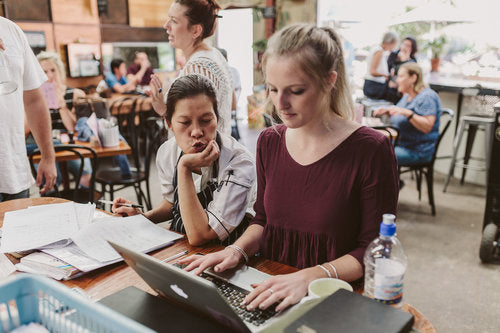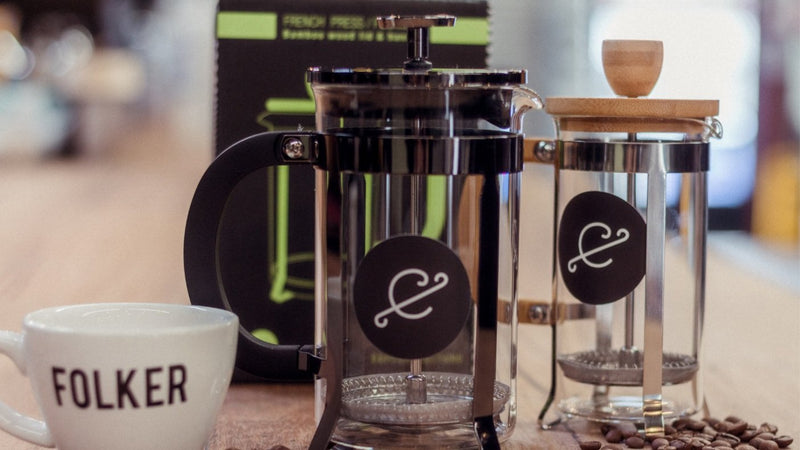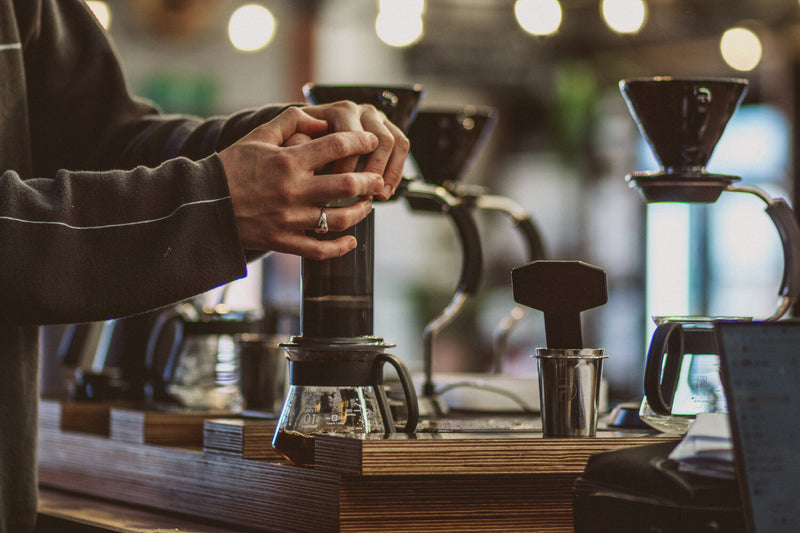Does your daily coffee do more harm than good?
Commonfolk’s Sam Keck chats with Tony Strickett from First Crop Coffee on fair trade practices, coffee farmers and the responsibility of roasters and importers to be honest from bean to brew.
S: Tony, you’ve been in the coffee industry for well over a decade and you’ve been running your green coffee importing company, First Crop Coffee, with your wife Celina for more than five years now; how does your typical Aussie coffee roaster source and purchase their green coffee beans?
T: The short and simple answer is roasters buy green coffee from importers like First Crop. The process of getting coffee from a dry mill to the port, and then to Australia, is another part of the long process that coffee goes though from farm to roaster.
Is it better to buy Fair Trade coffee?
In our opinion, no. Fair Trade is a set price for coffee to be traded at, which I think currently sits around US$1.60/lb. So, although the farmers may make slightly more than the cost of production (on average US$1.40/lb), there is no incentive to increase quality, as the payment remains the same. The other key issue is on the other side of the production process: There is no regulation or “set price” at the buyer’s end, so importers can make big margins off the back of the certification - looking like they’re helping and caring for farmers - but the farmers aren’t making as much money as it would appear. I am yet to see any Fair Trade farms doing better than the farms we work with.
I’ve read a number of studies in reputable journals that have found farmers using the Fair Trade certification were actually worse off than farms selling on the free market, largely due to costs associated with obtaining and keeping the certification. Does this mean we shouldn’t care about how the coffee was purchased? What’s this direct trade thing we often hear roasters talk about?
Direct trade is a marketing term the coffee industry uses to make people think the coffee is purchased directly from a farmer. This is rarely the case for a number of reasons; the most obvious reason being that 90 per cent of farmers don’t produce a finished product. To buy coffee from a farmer you would need to also have a washing station ready to process coffee, a dry mill to mill and pack the coffee, and an exporter to certify and load the coffee.
Not to mention the logistics of transporting coffee between these locations and the workers required to physically perform the work. There are so many points of contact in the process between a coffee tree and packing a container. And every bag/shipment of coffee that goes out has to go through government checks and phytosanitary examinations, so we’re literally talking about hundreds of people involved to move coffee from a tree to a boat. This is just the growing region side off the equation, on our side we’re faced with freight forwarding to get containers off the boat and out of the port, border holds, quarantine inspections, unpacking (300 x 70kg bags) palletising and storage.
The direct trade myth is doing a huge disservice to the many hands that work to get coffee from a farm to our shores, and it is a term that seeks to shine light on people’s supposed ethics and business savvy, but in reality it is a self-serving term that has been overused and bastardised by the coffee industry.
Does my local roaster really do that? It seems like a lot of work for a small business?
Do you want the real answer?
Yeah, let’s not beat around the bush.
No. There are probably [to my knowledge] three roasters in Australia who could claim they are anything close to direct trade, but even then the term is glossing over the fact that it’s not a realistic idea. (One of those roasters is Commonfolk with the Zukuka Bora project).
Wow and even with Zukuka Bora we had so much third party assistance to get the coffee to our roastery. First Crop played a huge role, as well as the dry mill in Uganda, the shipping company and the freight forwarder in Melbourne.
We’re loud and proud about working with importers that we believe support a fair and sustainable coffee industry.
A great importer can actually be a producer’s greatest ally. From Commonfolk’s perspective, we really only ever try and enter a direct relationship with a farmer we know we can purchase large volumes from year after year. Otherwise it’s not worth it from the farmer’s point of view. So you’re essentially telling me that most roasters are making this whole direct trade thing up?
LOL that escalated quickly, but yes.
So, how can we know if a farmer has been paid fairly?
There is no way to truly know other than to go to a farm and see for yourself. And even then, farmers are just one person in the process; there are pickers, farm hands, drivers, cooks, labourers and many others involved in the production of coffee on a farm. There’s no guarantees the farmers are taking care of the other people involved in the value chain – regardless of what they’re being paid.
I imagine it also varies from country to country? A farmer in Brazil must have very different needs to one in East Africa?
In Kenya and Ethiopia they have an auction system which helps to ensure higher prices for the farmers, and also gives the farmers control over when their coffee sells and how much, as they can withdraw their coffee if they’re not happy with the price achieved. Central America relies on companies like ours who want to pay fair prices and invest into communities. South America is similar but a different prospect altogether due to the mass production of Brazil. The cost of production also varies dramatically. It should seem obvious but economies of scale have a huge influence. A farmer that works a small plot of land on Mt Elgon Uganda and picks the coffee by hand is going to need a higher price per/lb than a huge corporation machine harvesting in Brazil.
What do you wish customers at your local cafe knew about the coffee buying process?
I don’t believe the end consumers need to know anything. My belief is that it’s the responsibility of importers and roasters to ensure the farmers and producers are sustainable and profitable businesses. It’s up to us to make coffee trade fair and balanced, because this is our business; roasters and importers don’t exist without coffee, so we have to safeguard that by protecting and investing in farmers and farming communities.
The end consumer just wants a coffee, and cafe owners just want a consistent product that keeps their customers coming back.
“It’s probably not what people want to hear, but the truth is that doing the right thing is on us - the importers and roasters - because this is our business and our life. I can’t go and visit coffee farmers and look them in the eye if I know I’m a contributing source of their poverty.”
If you could change anything about the coffee industry what would it be?
I’d make it like Jim Carrey’s movie Liar Liar, I’d love that for just a week everyone had to tell the truth. Because the more people continue to lie the direr it gets for farmers and producers of coffee. If all these roasters and importers are so concerned about farmers, why are we at the lowest point ever for the price of coffee? Why are more and more coffee farmers selling their land or uprooting their coffee trees? Direct trade has been on roaster’s social media and websites for years and years, yet farmers are getting poorer and poorer. The proof is in the pudding, many companies are built off the back of poor farmers who struggle to get by, not knowing that their photo got 500 likes on some roaster’s Instagram who told everyone that they bought the coffee directly from the farmer, despite the fact they probably never met the farmer let alone visited the country where the coffee actually came from. When everyone starts getting honest, we can make real change.
What does a positive future look like for coffee?
The future of coffee is not in the hands of consumers; it’s in the hands of the roasters. Roasters need to pay fair prices for coffee, they need to be perceptive about who they buy coffee from, they need to ask questions and work with people who can answer those questions satisfactorily.
The price of green coffee shouldn’t be the first thing that roasters look to when looking at their costs as a business. I also believe we need to invest in smart regulations on the importing side of coffee, so that coffee trading is balanced and fair.
Anything else?
Coffee is an amazing part of our culture and lifestyle. It’s probably Melbourne’s, if not Australia’s, national drink. The process of getting coffee from a tree to a grinder is an incredible and amazing journey. There is no other product like it. It takes hundreds of people and a mix of passion, logistics and commerce to make it happen. What we need to see is honesty. Because the hard truth is that most companies are only worried about their bottom line and they’ll accept the conditions that farmers face daily so they can turn their passion into a business or livelihood.
People will use photos of farmers, wild stories of where coffee comes from and how it’s grown, all to their advantage without considering that the can actually do something about it.
We are currently involved in social projects ranging from the building of a hospital in Rwanda, funding a school for children of coffee farmers in Colombia, supporting a farmer’s education program in Guatemala and funding the build of a washing station in Tanzania.
These are all projects that we don’t do for marketing but rather because we’re trying to make our business about more than just trading coffee. We’re building up communities to help create a new image for coffee farmers. We want farming to be a lucrative and sustainable business. We want to see communities thrive and grow with coffee as the backbone.
Thanks so much for your time and expertise Tony. Can’t wait to head back to visit some farms with you soon.
For more about First Crop Coffee visit www.firstcropcoffee.com
 Cart
Cart



